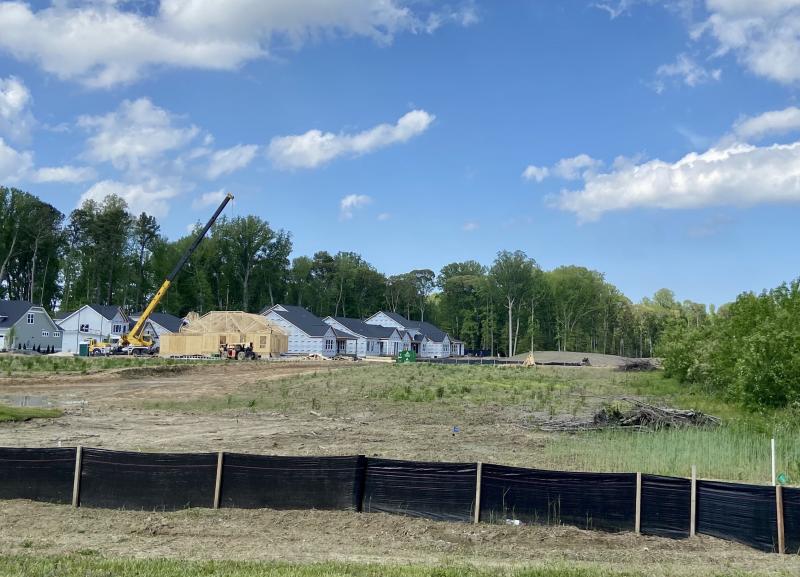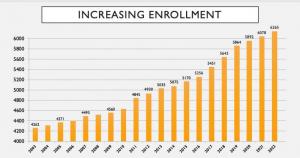Lack of school impact fees costs Cape Region taxpayers

As enrollment has increased in Cape Henlopen School District, so has a call for equity in the funding of major school construction and renovation projects to house the growing numbers of students.
Since Beacon and Mariner middle schools opened in 2003, district enrollment has grown by more than 2,000 students, with the biggest increases occurring in the last 10 years, according to data provided by Assistant Superintendent Jenny Nauman.
In 2011, the student population was 4,845. As of Sept. 30, 2021, 6,078 students were enrolled, and as of May 19 enrollment increased to 6,265 students.
Along with this growth has come a burgeoning need for new schools. The Cape district has churned out a school a year for six years for a total construction cost of $212 million, according to data provided by Cape Director of Capital Projects Brian Bassett.
Love Creek Elementary opened in 2017 and cost $30 million; H.O. Brittingham Elementary opened in 2018 and cost $32 million, including demolition costs; and Rehoboth Elementary opened in 2019 and cost $33 million.
Sussex Consortium opened in 2020 and cost $44 million, which was completely state-funded; Milton Elementary opened in 2021 and cost $35 million, and Lewes Elementary opened in April 2022 and cost $38 million.
The 2022-23 school year will be the first year since 2017 the district has not opened a new school, but the trend will continue with the opening of the new middle school in Lewes, which is slated for the 2024-25 school year and a cost between $53 million and $55 million, Bassett said.
While new schools have been constructed, expansions of existing district schools have also taken place.
Expansions to Beacon and Mariner were completed in 2015 at costs of $4.2 million and $2.1 million, respectively. Cape High, which opened in 2009-10 at a cost of $86 million, was expanded in 2021 at the cost of $16 million.
Since the construction of Cape High nearly 13 years ago, the total cost of school construction, expansion and renovation in the Cape district tops $320 million, not including the proposed costs for the new middle school in Lewes.
In the Cape district, the state pays for 60 percent of school construction costs, while local taxpayers pay the remaining 40 percent, except for the Sussex Consortium, which was state-funded.
In every Delaware county but Sussex, builders – many of whom operate statewide – pay an impact fee or voluntary assessment toward capital finances for major school construction and renovation projects.
New Castle County has had a voluntary school assessment since 1999 and Kent County has had a school impact fee since 2006. Such a fee in Sussex County could help fund school capital projects and ease taxpayer burden.
“The impact fees would have been huge for us as well as Indian River and other school districts in our county,” Bassett said. “I don’t understand how it can work in New Castle and Kent, and yet Sussex doesn’t have it.”
Impact fee history
New Castle County’s voluntary school assessment is in Delaware code. Developers must obtain a letter from the local school district stating the district has sufficient capacity to accommodate children in a new development.
If the district determines it does not have capacity, the developer must donate land to the district or pay a VSA per unit that cannot exceed 5% of the total cost to construct a residential unit.
Before a certificate of occupancy is issued, the developer must provide documentation from the Delaware Department of Education that the VSA has been paid.
Funds are held in an account that schools can access for additions, certain types of renovations, or for new school construction.
In Kent County, the school impact fee was enacted by county ordinance. County code states that a 1.16% surcharge of a building permit application’s proposed construction value goes to the local school district, and a 0.09% surcharge goes to Polytech School District, the county vocational school.
Construction value is determined by the Kent County Department of Planning Services. Fees are held by the county and released to districts when they show they have a capacity building project.
Why not Sussex?
Jeff Seemans, a Milton resident and former landscape architect for a developer, addressed Sussex County Council regarding school impact fees in October 2020, stating that New Castle County collects $5,738 for each new home, which goes to the local school district. Seemans quoted the county comprehensive plan that stated 9,543 housing units were issued permits from 2013 to June 2018.
“If you round that number to 9,000 and multiply by, say, an even $5,000 per permit, that is $45 million,” Seemans said. “But you can multiply 9,000 housing units by any number and then swallow hard when you realize that not one dollar has been collected – ever – to help build new schools.”
With most houses in Sussex County costing $300,000 or more, Seemans said, a $5,000 impact fee would be less than 2% of the cost of these homes.
In an April interview, Seemans said the state is throwing money away by not enacting such a fee in Sussex.
“No builder has gone broke in New Castle County because of it,” Seemans said. “It boggles the mind. It’s not going to just help seniors, but everyone with kids, a mortgage, car payment – all kinds of people. All we’re talking about is equity. It’s a fee. It’s simply a fee.”
Cape Superintendent Bob Fulton said May 19 that he has been working toward an impact fee system for some time to help alleviate the tax burden on residents when new schools are needed.
“Anything would be good,” he said. “It would be helpful if we could pull this off in Sussex County. It doesn’t seem fair that when we build, we have less options than other counties to lessen the cost for people who live in our district.”
Fulton said he has been discussing the matter with Sen. Stephanie Hansen, who represents the 10th District in the Middletown area of New Castle County and who has spearheaded a bill to address the funding inequity.
Senate Bill 287 moved out of the Senate Education Committee May 18 for consideration by the full Senate.
The bill references the VSA in New Castle County and states that “Kent and Sussex counties should also be enabled to utilize the voluntary school assessment and other agreements as set forth herein to promote concurrency between residential development and adequate school capacity.”
The bill would amend Delaware code “to require that Sussex County’s comprehensive plan for planning and development include an educational element concerning the construction and allocation of school facilities within school districts.”
As drafted, the bill enables the county to require developers to provide certification from the Department of Education that the district has adequate capacity to accommodate children in the new development before the major subdivision plan is recorded.
The certification would not be required in 55-plus developments and in low-income housing.
If adequate capacity doesn’t exist, a VSA would be calculated on a per-unit basis on building permits issued in new developments and be paid to the Department of Education when the certificate of occupancy is obtained for each unit.
The fee would be held by the state and released to school districts when needed for construction to increase school capacity.
If such a bill is enacted, Fulton said, the next time the district goes to referendum, funds would help offset the cost to district homeowners.
“It would be great if it would occur,” Fulton said. “It would benefit our residents and community with supplemental funds as we continue to build in the future. I don’t see the growth slowing down.”
In a May 19 email, Hansen said the Delaware School Boards Association came out in opposition to the bill as currently written.
“My plan is to reach out to the DSBA, the superintendents through Mr. Fulton, and others to see if there are parts of the bill upon which there is consensus and then discuss their thoughts on the remainder,” Hansen wrote.
In its letter of opposition, DSBA stated members supported implementing New Castle’s VSA system in Kent and Sussex counties, but have concerns about the change in the process for New Castle County. The bill changes the VSA calculation by allowing for potentially additional impact fee amounts, DSBA wrote.
DSBA also opposes putting the ultimate discretion for approving or denying new developments on school districts, an authority Fulton also said he did not think school boards should have. Boards are not experts in land-use planning, and such authority could politicize boards and their members, Fulton said.
State engineering organizations Builders and Remodelers Association of Delaware and the American Council of Engineering Companies of Delaware also opposed the bills in letters sent to Hansen May 18.
BRAD stated that New Castle and Kent counties have impact fee systems in place and the enabling language that allows all three counties to adopt a voluntary school assessment program seems unnecessary.
Stating they will work with sponsors of the bill, BRAD and ACEC both wrote, “We request that the language be amended to remove the school boards as the ultimate authority to approve land development as well as remove the provision regarding secondary impact fee agreements.”
Regarding an April 1 request for comment about school impact fees in Sussex County to local legislators Speaker of the House Rep. Pete Schwartzkopf, D-Rehoboth; Sen. Ernie Lopez, R-Lewes; and Rep. Steve Smyk, R-Milton; Schwartzkopf did not respond.
Lopez, who sits on the Senate Education Committee, and Smyk both said in an April 4 email that no local school officials have ever broached the subject of school impact fees with them.
Schwartzkopf, Lopez and Smyk did not respond to a May 19 request for comment on the inequity of the current system and the proposed bill.





















































